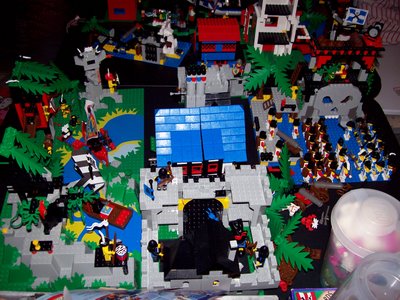Mac Crack
On July 4th I started an experiment with Apple's Mac when I bought a MacBook. I also started a measure of how much of Apple's hype is legit and how much is just hype. Time for an update.
The Applesauce meter was last at 80% water/20% apple, where the more water, the more fake Apple's hype. It shifted to 75/25 when I went looking for software and security updates. Not only was the process real simple, but the security updates actually sped up the MacBook's boot up process. I was stunned.
Now, two serious problems have popped up with the Mac. First, I noticed a hairline crack in the side of the case, near a steel screw by the optical drive slot. Let me say that I have treated the MacBook very gently, even bought a cushy backpack to carry it around in. The polycarbonate case is supposed to be near indestructible and the white MacBook's gleaming case makes you want to treat it very gently.
I checked the Mac site's support discussions and there are others who have had this problem. Some had the case replaced completely, and then had it crack again. The great number of cracks were stress type cracks in the case in the back hinge area or the screen's case top. Some people managed to get it replaced under warranty, others not. A trip to the Apple store resulted in them saying that they consider any such damage on a unit owned for several months to be the owner's fault. How convenient for them. Apple has a reputation for being stingy and unresponsive when it comes to support - see the iPod battery replacement fiasco.
The second problem is that in the last couple of days the battery, which has been providing about 4 hours plus since I bought it, decided on Thursday to go into tailspin and ran down in about 2.5 hours. The computer is about five plus months old - way too early for the battery to head into senility. It might be just in need of a calibration, which I did on Friday. It's still giving about 2.5 hours of charge, according to it's own estimate.
These are two hardware problems coming one after another. While Mac has fine software (Mac OS X rocks) and nicely designed hardware, there are people who complain that Apple goes cheap on the hardware. Case in point is the iPod case, which scratches real easy supposedly and launched a whole industry in case covers and skins. The early MacBooks also were knocked for running really hot.
The Applesauce meter now stands at 90/10. In the past I have faulted Apple for being so hyped about its design acumen that the design actually is poor. The crack in the case may be a sign of that. If it doesn't spread (I am not paying $300 to fix it), then it won't be a big deal. The battery, on the other hand, I will have to deal with if another recalibration doesn't fix it. That has to be a warranty-covered repair.
The Mac experiment is edging closer to being not just a failure, but possibly a mistake. The ideal situation, as one Mac analyst said, would be if Mac OS X could be put on non-Apple PCs and laptops to have the best of both worlds.






